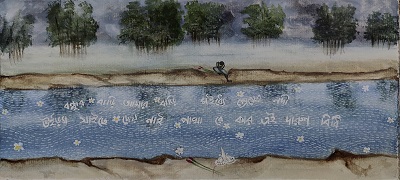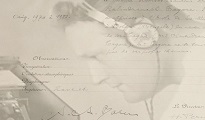In Broken Bengal
In 1956, Arnold and Corrie Bake came to India for the last time. Now Bengal was partitioned and the land was broken. Bake made some recordings on magnetic tape with a reel-to-reel machine. These recordings led me through a series of excavations, where the recordings themselves become the ground under which lie buried stories and sounds of unknown histories. The point about history is important here, more important than in any other chapter, I think, because Bengal was changed at this point. It was no longer the Bengal where Bake had arrived in 1925 and stayed on and off until 1946. This chapter is divided into four sub-chapters, relating to Bake’s recordings, letters and photographs from this trip.
The reasons for calling this sub-chapter Sadhushongo (in the company of the sadhu or the wise one) are many. Firstly, it takes off from a letter Bake wrote to his old teacher and friend, the wise Kshitimohan Sen, in 1955. Kshitimohan had inspired a love for baulgan in Arnold Bake, a musical practice where ‘shadhushongo’ is way of teaching and learning the song. Secondly, I went with the letter to meet my own old and wise teacher, Kshitimohan’s grandson Shibaditya Sen, and he gave me some recordings of Khoda Baksh Sai and others.
Chitralekha Choudhury is a renowned Rabindrasangit singer, who studied in Santiniketan in the 1950s. Her mother, the painter Chitranibha Choudhury was one of the first female students of Kala Bhavan in the 1920s. When Arnold Bake had recorded Chitralekha in March 1956, she was a young girl of fifteen. When I went to meet her with her song in Kolkata in 2015, Chitralekha had many great stories of historical significance to tell.
When Arnold Bake had recorded Indira Devi Chaudhurani, Rabindranath’s niece who was one of his best friends and confidante, in her home in Santiniketan, she was 83 but her voice was still steady and her memory intact. In 2016, Supriyo Tagore listened to his father’s aunt, who used to live with them at the close of her life, and memories happy and sad came flooding to his voice.
This rare and precious recording would have stayed in the British Library Sound Archives, unnoticed, unnamed and unplayed, had I not accidentally come across it in 2018. The process of naming Nabanidas’ voice was a longwinded journey. Young Purna Das Baul was in the concert with his father Nabanidas in 1956. In 2019, it was very emotional for Purna Das to listen to his father, sister, brother-in-law and friend, as well as to himself as a young man.



